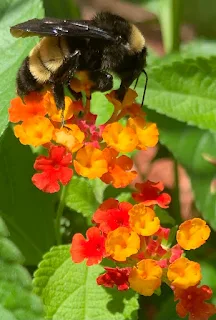A Healthy Appreciation for Bugs! By Rebecca Wenrich Wheeler
Thank you Rebecca for joining in today! She's doing a blog tour with WOW! Women on Writing about her book "When Mama Grows With Me"
Many people would not place the words appreciation and bugs in the same sentence. Bottom line, bugs keep our ecosystem in balance. Without bugs, human existence couldn’t thrive. According to BBC Science Focus, if all bugs suddenly disappeared, we would have complete ecological collapse and global famine. That is enough to convince me! Bugs pollinate crops, enrich the soil, control pests, and serve as food for many species.
Even the cringiest of all bugs, the cockroach, serves a purpose (although I would much prefer he serves his purpose in my yard and not my house). Cockroaches are decomposers. They eat decaying plant matter, and in turn, deposit nitrogen back into the soil. Nitrogen is crucial for healthy plant growth. Am I saying don’t terminate the critter if you find him in your house? No, as cockroaches do carry bacteria and trigger allergies, but if you see him outside in his appropriate habitat, let him decompose that organic matter in peace.
It’s one thing to shrink in disgust at a cockroach, but what about the amazing pollinators, like butterflies, moths, beetles, and bees? Media often centers on the honeybee, but there are over 20,000 species of bees. With the focus on honeybees, one would assume it’s the endangered bee, when in actuality, the native bees are threatened ones. See The National Wildlife Federation for more detail. Native bees like a natural habitat, which you can create in your own backyard. For a list of pollinator-friendly plants by region click here, and check out my tips on creating a pollinator garden.
If your child is squeamish around bugs, try the following:
- Acknowledge their feelings and talk through fears. Consider your own reactions to bugs and how those reactions might be impacting your child.
- Talk with your child about bug safety. Some bugs are best observed at a safe distance, like bees and wasps. Other bugs, like ladybugs and dragonflies, are safe at close range. Maybe you’ll be lucky enough to have a dragonfly land on you!
- Teaching your child to remain calm around bugs will also improve safety. Kids understand size differences. Bugs are tiny, and they are probably more scared of you! Rather than shrieking and flailing when you see a bug, practice remaining calm. If you stay calm, the bug is more likely to stay calm as well.
In my second yoga-inspired picture book When Mama Grows with Me, Mama models how to calmly observe the bees, and the pair practices bee’s breath in honor of their fuzzy friends!
“During the daytime, Mama and I stand very still so we can hear the buzzing bees. The sound comes from their wings beating very fast, which makes the air vibrate. To our ears, the vibrations sound like a hum.
I know all the waiting has been worth it since the bees love our colorful flowers! Mama and I thank the bees for keeping our garden healthy by making our own bee sounds.”
-from When Mama Grows with Me
The next time you’re asked, “What’s your favorite bug?” I hope you have a long list!
Thank you Rebecca!
About the Author, Rebecca Wenrich Wheeler
Rebecca Wenrich Wheeler was raised in West Point, a small town in the Tidewater region of Virginia. From the moment she submitted her first short story to a young author’s contest in second grade, Rebecca knew she wanted to be a writer. Her love of writing led her to earn a BA in English and an MEd in English education. She spent several years as a high school teacher, during which she also developed a passion for mental health advocacy. Rebecca completed an MA in professional counseling and now works in school-based mental health and as a college adjunct psychology instructor.
Rebecca also teaches yoga for the young and the young at heart, and she likes to infuse yoga and breathwork in her counseling practice wherever she can. She believes the most valuable use of her time is teaching youth how to love and care for each other and the world around them. Her stories share this focus on positive relationships and a love of nature. Rebecca now lives in Durham, North Carolina, with her husband, two children, and two spoiled Siamese cats.
When Mama Grows with Me is Rebecca’s third book. Her first picture book in the yoga series, When Daddy Shows Me the Sky released November 2021, and her first YA novel, Whispering Through Water, released January 2023.
You can follow her on Instagram @rebeccawwheeler_author, Twitter @RWW_author and www.rebeccawwheeler.com




